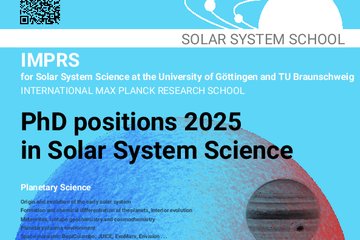All genres
61.
Journal Article
Statistical Study of Free Magnetic Energy and Flare Productivity of Solar Active Regions. Astrophysical Journal 788 (2), 150 (2014)
62.
Journal Article
Global Solar Free Magnetic Energy and Electric Current Density Distribution of Carrington Rotation 2124. Solar Physics 289, pp. 4031 - 4045 (2014)
63.
Journal Article
First use of synoptic vector magnetograms for global nonlinear, force-free coronal magnetic field models. Astronomy and Astrophysics 562, A105 (2014)
64.
Journal Article
A Comparison Between Nonlinear Force-Free Field and Potential Field Models Using Full-Disk SDO/HMI Magnetogram. Solar Physics 289 (3), pp. 831 - 845 (2014)
65.
Journal Article
Force-free Field Modeling of Twist and Braiding-induced Magnetic Energy in an Active-region Corona. Astrophysical Journal 780 (1), 102 (2014)
66.
Journal Article
Quasi-static Three-dimensional Magnetic Field Evolution in Solar Active Region NOAA 11166 Associated with an X1.5 Flare. Astrophysical Journal 792 (10), 40 (2014)
67.
Journal Article
The magnetic field in the solar atmosphere. Astron. Astrophys. Rev. 22, 78 (2014)
68.
Journal Article
Temporal Evolution of the Magnetic Topology of the NOAA Active Region 11158. Astrophysical Journal 787 (1), 88 (2014)
69.
Journal Article
2D and 3D Polar Plume Analysis from the Three Vantage Positions of STEREO/EUVI A, B, and SOHO/EIT. Solar Physics 283, pp. 207 - 225 (2013)
70.
Journal Article
Magnetic Energy Partition between the Coronal Mass Ejection and Flare from AR 11283. Astrophysical Journal 765, 37 (2013)
71.
Journal Article
Evidence for Solar Tether-Cutting Magnetic Reconnection from Coronal Field Extrapolations. Astrophysical Journal 778 (2), L36 (2013)
72.
Journal Article
Fragmentation of electric currents in the solar corona by plasma flows. Astronomy and Astrophysics 556, A61 (2013)
73.
Journal Article
Double Power-law Distribution of Magnetic Energy in the Solar Corona over an Active Region. Astrophysical Journal 764, 86 (2013)
74.
Journal Article
Full-disk nonlinear force-free field extrapolation of SDO/HMI and SOLIS/VSM magnetograms. Astronomy and Astrophysics 550, A14 (2013)
75.
Journal Article
Modeling coronal magnetic field using spherical geometry: cases with several active regions. Astrophysics and Space Science 347 (1), pp. 21 - 27 (2013)
76.
Journal Article
Comparison of force-free coronal magnetic field modeling using vector fields from Hinode and Solar Dynamics Observatory. Astrophysical Journal 769, pp. 59 - 68 (2013)
77.
Journal Article
Evolution of the Fine Structure of Magnetic Fields in the Quiet Sun: Observations from Sunrise/IMaX and Extrapolations. Solar Physics 283, pp. 253 - 272 (2013)
78.
Journal Article
First 4D Reconstruction of an Eruptive Prominence Using Three Simultaneous View Directions. Solar Physics 281, pp. 121 - 135 (2012)
79.
Journal Article
Doppler shift of hot coronal lines in a moss area of an active region. Astronomy and Astrophysics 548, A115 (2012)
80.
Journal Article
Particle kinetic analysis of a polar jet from SECCHI COR data. Astronomy and Astrophysics 538, A34 (2012)











